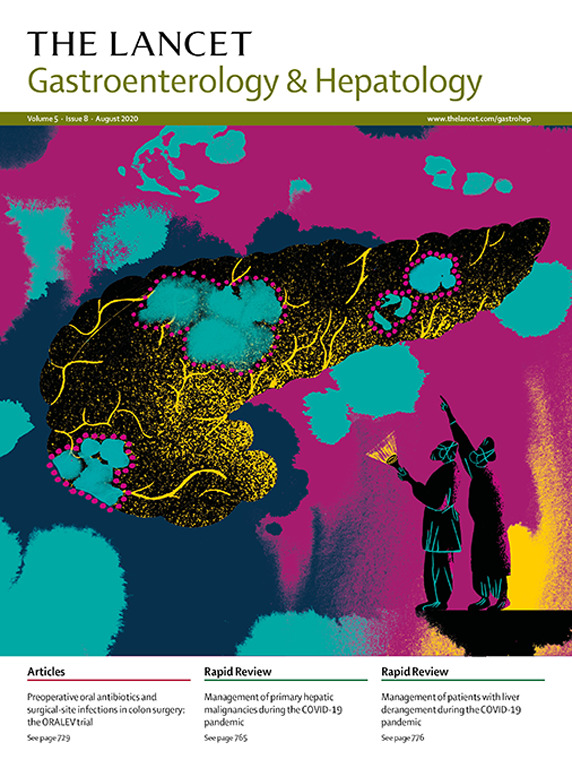内镜与外科胃造口术缓解恶性胃出口梗阻(ENDURO):一项随机对照试验
IF 38.6
1区 医学
Q1 GASTROENTEROLOGY & HEPATOLOGY
引用次数: 0
摘要
背景:对于恶性胃出口梗阻的患者,超声内镜引导下的胃肠造口术可能优于手术,但随机试验很少。我们的目的是评估超声内镜引导下的胃肠造口术与外科胃肠造口术后恢复口服摄入的时间和需要再次干预的持续或复发性阻塞性症状的比率。senduro是一项多中心、随机对照试验,在荷兰12所学术和教学医院进行。具有至少20例任何适应症的LAMS安置经验、至少10例内镜下胃肠造口术经验并获得批准的医院有资格在试验中独立进行内镜下胃肠造口术。年龄在18岁及以上的有症状的恶性胃出口梗阻的姑息性患者被随机(1:1)分配到内镜或手术胃肠造口术组。采用电子数据采集系统进行随机化,采用随机生成的2和4组,并按世卫组织绩效状况(0-1和2 - 3)分层。第一个主要终点是恢复固体口服摄入的时间(胃出口阻塞评分系统评分≥2)。第二个主要结局是非劣效性的持续或复发的阻塞性症状需要再次干预。预定义的风险差异非劣效性裕度为20%。对所有随机分配的参与者的所有结果进行分析。该试验已在国际临床试验注册平台NL9592注册,并已完成。在2022年2月18日至2024年2月26日期间,筛选了250例患者,其中98例随机分配到内镜下胃肠造口术(n=48)或手术胃肠造口术(n=50)。女性43例(44%),男性55例(56%)。内镜下胃肠造口术比外科胃肠造口术到固体口服的时间更短(中位1天[IQR 1 - 3] vs 3天[1 - 6],风险比2.21 [95% CI 1.43 - 3.42]; p= 0.0003)。对于需要再次干预的持续性或复发性梗阻性症状,内镜下胃肠造口术不低于外科胃肠造口术(5例[10%]vs 6例[12%],风险差异为1.6% [90% CI上限8.9])。内镜胃肠造口组有28例(58%)患者报告了总体不良事件,手术胃肠造口组有32例(64%)患者报告了总体不良事件(相对危险度0.91 [95% CI 0.66 - 0.25])。内镜下胃肠造口组发生1例死亡事件,手术组发生3例死亡事件。对于恶性胃出口梗阻患者,在恢复固体口服摄入的时间上,内镜下胃肠造口术的姑息性治疗优于外科胃肠造口术,并且在需要再次干预的持续或复发性梗阻症状的发生率上也不低于外科手术。基于这些结果,内镜下胃肠造口术应该是恶性胃出口梗阻患者的首选姑息治疗方法。资助荷兰癌症协会。本文章由计算机程序翻译,如有差异,请以英文原文为准。
Endoscopic versus surgical gastroenterostomy for palliation of malignant gastric outlet obstruction (ENDURO): a randomised controlled trial
Background
In patients with malignant gastric outlet obstruction, endoscopic ultrasonography-guided gastroenterostomy might be superior to surgical gastroenterostomy, but randomised trials are scarce. We aimed to assess time to resumption of oral intake and the rate of persistent or recurrent obstructive symptoms requiring re-intervention following endoscopic ultrasonography-guided gastroenterostomy compared with surgical gastroenterostomy.Methods
ENDURO was a multicentre, randomised controlled trial conducted at 12 Dutch academic and teaching hospitals. Hospitals with experience in at least 20 LAMS placements of any indication, at least ten endoscopic gastroenterostomies, and approved competence were eligible to perform endoscopic gastroenterostomy independently within the trial. Adults aged 18 years and older with symptomatic, malignant gastric outlet obstruction in a palliative setting were randomly assigned (1:1) to endoscopic or surgical gastroenterostomy. Randomisation was performed with an electronic data capture system using randomly generated permuted blocks of 2 and 4 and stratified by WHO performance status (0–1 and 2–3). The first coprimary outcome was time to resumption of solid oral intake (Gastric Outlet Obstruction Scoring System score ≥2). The second coprimary outcome was non-inferiority for persistent or recurrent obstructive symptoms requiring re-intervention. The predefined non-inferiority margin of the risk difference was 20%. All outcomes were analysed in all randomly assigned participants. This trial was registered in the International Clinical Trials Registry Platform, NL9592, and is completed.Findings
Between Feb 18, 2022, and Feb 26, 2024, 250 patients were screened, 98 of whom were randomly assigned to endoscopic gastroenterostomy (n=48) or surgical gastroenterostomy (n=50). 43 (44%) patients were female and 55 (56%) were male. Endoscopic gastroenterostomy had a shorter time to solid oral intake than surgical gastroenterostomy (median 1 day [IQR 1–3] vs 3 days [1–6], hazard ratio 2·21 [95% CI 1·43–3·42]; p=0·0003). Endoscopic gastroenterostomy was non-inferior to surgical gastroenterostomy for persistent or recurrent obstructive symptoms requiring re-intervention (five [10%] vs six [12%], risk difference 1·6% [upper limit of 90% CI 8·9]). Overall adverse events were reported in 28 (58%) patients in the endoscopic gastroenterostomy group and 32 (64%) in the surgical gastroenterostomy group (relative risk 0·91 [95% CI 0·66–1·25]). One fatal event occurred in the endoscopic gastroenterostomy group and three fatal events occurred in the surgical gastroenterostomy group.Interpretation
In patients with malignant gastric outlet obstruction, palliative treatment with endoscopic gastroenterostomy was superior to surgical gastroenterostomy for time to resumption of solid oral intake and was non-inferior for the rate of persistent or recurrent obstructive symptoms requiring re-intervention. Based on these results, endoscopic gastroenterostomy should be the preferred palliative treatment for patients with malignant gastric outlet obstruction.Funding
KWF Dutch Cancer Society.求助全文
通过发布文献求助,成功后即可免费获取论文全文。
去求助
来源期刊

Lancet Gastroenterology & Hepatology
Medicine-Hepatology
CiteScore
50.30
自引率
1.10%
发文量
0
期刊介绍:
The Lancet Gastroenterology & Hepatology is an authoritative forum for key opinion leaders across medicine, government, and health systems to influence clinical practice, explore global policy, and inform constructive, positive change worldwide.
The Lancet Gastroenterology & Hepatology publishes papers that reflect the rich variety of ongoing clinical research in these fields, especially in the areas of inflammatory bowel diseases, NAFLD and NASH, functional gastrointestinal disorders, digestive cancers, and viral hepatitis.
 求助内容:
求助内容: 应助结果提醒方式:
应助结果提醒方式:


